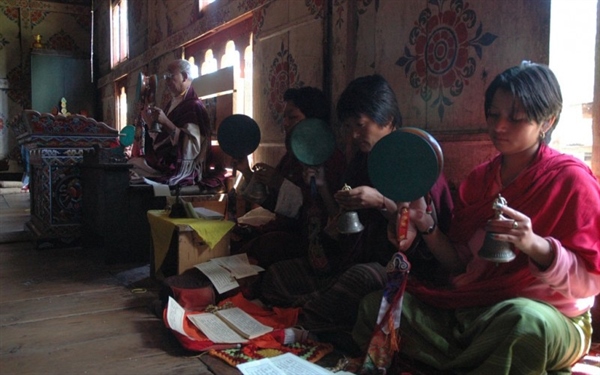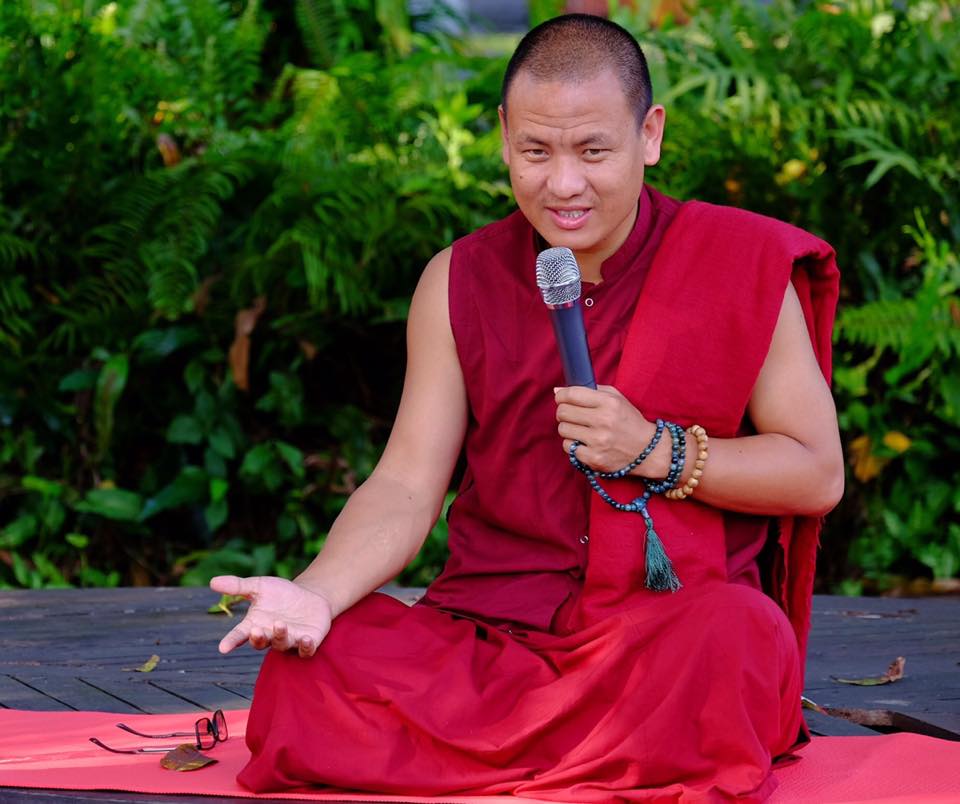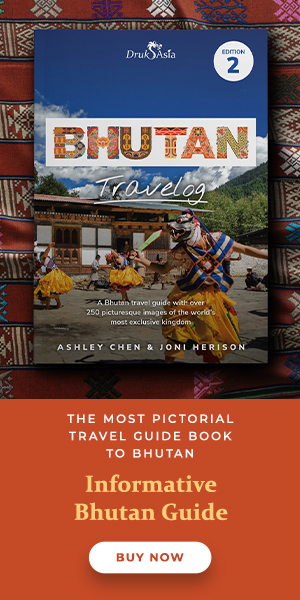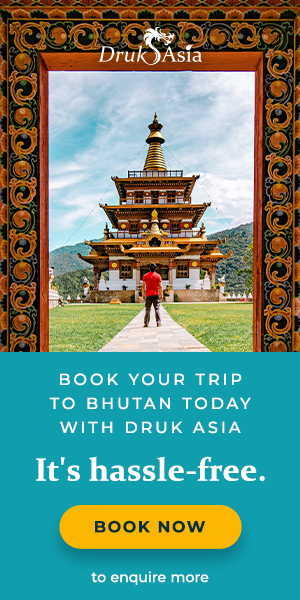True Purpose of Rituals And Their Importance In Buddhism
Rituals are an indispensable way of life for a Bhutanese household and families are known to spend a fortune on them.
 Performing a ritual in a monastery.
(Source: Bhutan Cultural Atlas)
Performing a ritual in a monastery.
(Source: Bhutan Cultural Atlas)
By Kinley Yangden | Daily Bhutan
Rituals, or pujas, are commonplace in Bhutan and entrenched into the culture. Religious ceremonies are practised on official occasions and a wide range of rituals are performed in villages to local deities.
Buddhism in the Himalayan region has incorporated local beliefs of deities that reside in the mountains, lakes and forests. The worship of these deities through ritualistic practices are an essential part of religious life for the Bhutanese. A variety of rituals are held to ward off evil spirits and to appease local deities, usually performed by lay practitioners (gomchen) or monks.
Other smaller ceremonies include offerings to the altar room, reading of sacred texts, and inviting lamas to perform rituals to remove obstacles and for the prosperity and well-being of the household.
Although there is a thin line in Tantric Buddhism in what one may call as Buddhist or non-Buddhist, rituals are an indispensable way of life for a Bhutanese household. Because of this, families are known to spend a fortune on rituals. Depending on the scale of the ritual and its purpose, a small ritual costs at least 5,000 Nu or more, while a larger ritual – such as the annual ritual to appease local deities – can cost up to 60,000 Nu. Some households are known to spend even more, sometimes up to 1 lakh (100,000 Nu). Funeral rites are the costliest at an average of 2 to 3 lakhs (200,000 to 300,000 Nu) and more.
Daily Bhutan spoke to His Eminence Khedrupchen Rinpoche of Sangchen Ogyen Tsuklag Monastery in Trongsa about the role of rituals in Bhutan alongside Buddhism, and what should one do if rituals are beyond their economic means.

Khedrupchen Rinpoche has given talks on implementing Buddhism in the modern world. (Photo: Facebook/Khedrupchen Rinpoche)
Q: What are the true purposes of rituals or pujas?
A: Some rituals are conducted as offerings to deities to bless the household, for positive luck and so on. In some parts of Bhutan, there are annual rituals that are conducted to make offerings to deities that they take temporary refuge in.
Another type of ritual is for the deceased and is normally held on the third, seventh, 14th, 21st and 49th day after death.
Some people believe in conducting rituals to purify themselves from obstacles, especially those who have businesses.
Rituals are methods where the essence of Buddhism is taught or practiced. But these days, people do not understand the meaning and purposes of rituals. Some believe that the more rituals they do, the more fortune they will get.
Nowadays, rituals have become competitive. For example, in one household, they brew a special wine as an offering. Another family will make three to four varieties, and another may want to make five or six different varieties. This is egoistic-driven and the intentions are wrong. I am not saying that making varieties of wine to offer is wrong, but it has to be within one’s own economic means.
Whatever ritual we perform, there has to be three instructions to be strictly followed.
First, every ritual has to begin with bodhicitta (love and compassion). A ritual is meant to benefit all sentient beings.
Second, a ritual has to have non-duality or non-expectations. If you are conducting a ritual for certain purposes that involves expectations, you are not following instructions. Once you are demanding, that is not the right way to do it. Whatever you do, if you do it with a pure heart, whatever blessings will come.
Third, the dedication of the merits gained from the ritual has to be devoted to everyone, not just for yourself. Dedicating merits to sentient beings also means that you are dedicating them to yourself as well.
Q: What are some rituals that are necessary?
A: The biggest blessing or ritual one needs to perform every day is to be a loving and compassionate person. That is the essence of every ritual. If you are a person who is like that, you not only create a peaceful society, it also makes yourself happier.
Deities are actually dharma protectors and their main purpose is to protect people who practice the dharma like a “mother guiding her child”. So the important ritual that you need to do is a brief annual ritual. If you are unable to do that, it is not mandatory.
Another important ritual is for the deceased. This is because after their death, the deceased go through a different realm that we humans cannot see. They have to face this bardo and they need to be “introduced” to the bardo realm.
If you can’t afford a ritual for a deceased, you can retreat to a monastery and seek the monks’ help to conduct one. For example, in my monastery, two or three monks will immediately go to a household without invitation and without receiving any offerings, and simply offer their prayers to the deceased. This is very beneficial, as everyone’s prayers is required.
We have never fixed a rate, that is not the attitude of monks. Even if it’s just a single penny, one Ngultrum, we will happily do it because it is a service to the community.
Q: Are rituals important at all as a Buddhist practitioner?
A: Instead of putting rituals as the utmost importance, I would say the most important thing as a Buddhist practitioner is to focus on yourself.
You can perform rituals every day, every night, but if you cannot tame your emotions and mind, no matter how many rituals you conduct, the rituals will never be able to make you a Buddha.
The main goal of becoming a Buddha is not to look for temporary solutions but the ultimate liberation. I would never discourage people who want to perform rituals, but I will not encourage as well.
Instead, I encourage people to study the meaning in the prayers and the deeper essence of Buddha’s teachings. We have to focus on how to regain these wisdoms and not on the methods. This is the only way to counter the challenge of misunderstanding what rituals are about.
Besides studying, another important thing is to practice Buddhism and to enjoy doing it. Practising Buddhism allows for bringing happiness back to the home and no rituals will be needed when true happiness exists.
Q: Some people conduct rituals to get rid of evil eye or for purification purposes. Are these based on superstition?
A: Superstition is like daydreaming. Whatever we are doing now, we are living in a dream life, an illusion. Superstition is somewhat similar.
Some superstitions are good things, it is not always bad. Because of superstitions, you learn to wake up from them, to meditate and learn to make your life positive.
For example, some parents hold rituals to benefit their children based on a belief that someone else told them. It is not necessary to do such rituals but the best rituals parents can do is simply to make prayers. It is not a difficult job. It is not required to ask someone from a monastery to do it for you as a ritual. You can do it yourself.
I have been advising people, for example pregnant women, that the best ritual for you is not to drink alcohol, don’t smoke, and don’t let your emotions govern you. That’s the actual ritual that mothers need to perform – and also to practice bodhicitta yourself.
Experience a 7 Days 6 Nights Neykor Tour: A Journey Of Spiritual Immersion with Druk Asia and Khedrupchen Rinpoche. The tour starts from US$2,449 per person and includes flights, taxes, visa, accommodation, meals, a licensed tour guide and transportation. More information on the tour can be found here or email hello@drukasia.com for queries.




